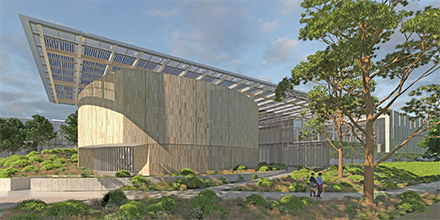
Over the last decade, Microsoft has demonstrated a commitment to carbon reductions, resulting in the company achieving carbon neutrality across its global operations since 2012. In Mountain View, California, this commitment to environmental sustainability has driven the redesign of its Silicon Valley campus including the use of cross laminated timber (CLT). Source: Timberbiz
Key initiatives to that for environmental sustainability include restoration of the surrounding habitat, thermal energy storage, data-driven optimization of power use, and net-zero water usage; in which 100% of the building’s nondrinking water will come from rainfall or on-site recycled water.
Less familiar, but no less significant for sustainability, is the project’s use of CLT.
As durable as concrete and requiring significantly less energy to produce a comparably strong steel beam, CLT is proving an increasingly popular alternative to both.
Lightweight but strong, it performs better against fire and earthquakes than conventional structural materials. Because prefabricated materials arrive at a job site cut and ready to go, they go up faster and leave less waste than concrete or steel.
CLT is also beautiful, creating ceilings and columns which don’t need plaster walls thus reducing material usage while bringing the warmth of natural wood indoors.
Foremost among its benefits for Microsoft however, is what CLT doesn’t bring which is significant amounts of embodied carbon. CLT is not as energy-intensive to produce, and because as a building product it stores carbon dioxide.
Around 345,000 square feet of CLT will be used which represents over half the structural component of the campus and puts Microsoft Silicon Valley on track to become the largest wood structure in the US, by volume of wood used.
To ensure that it’s sourced from responsibly managed forests, 100% of the wood will be certified by the Forest Stewardship Council (FSC).
Microsoft has also sponsored the development of a new tool called the Embodied Carbon Calculator for Construction, or EC3. Developed by Skanska in partnership with the University of Washington’s Carbon Leadership Forum, EC3 is an open-source tool running on Microsoft Azure which tracks the embodied carbon of raw building materials.





